
A poker dealer distributes cards to players and manages the action at a poker table. [1]

A poker dealer distributes cards to players and manages the action at a poker table. [1]
Any casino with a poker room must hire a staff of dealers. Casinos generally pay dealers minimum wage. However, a dealer's primary source of income is not salary, but tips from players. Tip income may be substantial for dealers who can deal hands quickly and efficiently. There are a few exceptions for taking tips. (e.g., in Sweden, where all the casinos are owned by the state, dealers and other casino personnel may not accept tips from players. This rule is complied with strictly.)
To become employable by a casino, applicants without prior experience are typically required to complete a 4 to 6 week training program at a dealing school. Dealing in a casino may require working late hours and remaining seated for long periods of time. Dealers also commonly work holidays, since these are especially busy days for casinos. Having to deal with difficult individuals or abusive players may be another drawback to dealing at a casino.
Major poker tournaments also hire dealers. For a given tournament stop, the tournament coordinator will hire dealers on contract for the duration of the tournament, which may be a few days to a few weeks. Room and board may or may not be provided by the tournament management; the dealer is typically responsible for their own travel expenses.
Dealers must be proficient in shuffling the deck, distributing the cards to the players, and, if required by the game being dealt, turning up the community cards in the center of the table. There are two methods of distributing the cards, "American"-style and "European"-style.
To shuffle the cards, the dealer follows a sequence defined by the casino. First all cards are spread out on the table and pushed around randomly. This is called "scrambling" or "washing" the cards. Then the cards are collected and squared into a deck. At this point a typical shuffling sequence might be: riffle, riffle, box, riffle. Professional dealers always keep both halves of the deck very low to the table while shuffling. Some casinos have automatic shufflers built into the table that shuffle a different deck of cards while the previous hand is being played, which speeds up the game.
Finally, a cut card is placed on the table and the deck is cut onto the card. The cut card is held on the bottom of the deck for the entire hand, to keep the bottom card from being exposed.
In American-style dealing, the deck is held in one hand, and the dealer uses the thumb of their deck hand to slide the top card of the deck toward their pitching hand. The pitching hand clasps the card between the thumb and index finger while at the same time the mid-point of the card touches the face (nail) of the middle finger. It is the extension of the middle finger that "pitches" the card off the top of the deck and a whooshing sound should be heard as each card exits the top of the deck.
The ability to pitch cards accurately is critical, since the cards must be delivered in a way that no players at the table can see the undersides of the cards.
European-style dealers touch only the top of each card being dealt. The card is pushed off the top of the deck to the table surface in front of the dealer. The dealer then propels the card toward the recipient, usually imparting some spin to the card to encourage sliding.
Before dealing a community card, the top card off the deck is burned, or discarded. The rationale for burning is that the top card on the deck is visible to players during the previous betting round, so that a cheat might be able to spot a mark on the top card and therefore gain an advantage on his opponents.
When burning, the deck must be held low and the burn card kept level with the table surface. Casinos watch carefully to make sure a dealer does not "flash", or inadvertently expose, the burn cards to players at the table.
In flop games, the three community cards comprising the flop are turned up simultaneously, never one at a time.
Dealers control the action during a hand. This may include prodding players to act, verbally announcing actions of players to the rest of the table, and correcting players who act out of turn.
Dealers also must manage the pot. The dealer must verify the amount of bets and raises by players, collect folded hands, maintain side pots, and read players' hands at showdown to identify the winner or winners. In games with a rake, the dealer also must keep track of the amount of money in the pot and remove the appropriate amount for the house.
At times the dealer needs to communicate with the floor, or other casino staff. Some casinos equip the dealers with a headset or walkie-talkie for this purpose, while in other casinos the dealer must shout over the ambient noise. The following table shows some common calls a dealer may make, and their meanings:
| Call | Meaning |
|---|---|
| "Floor" or "Decision" | Requests the floor manager to come to resolve a dispute. |
| "Seat open" | Announces that a player has left the game and a seat is now available. |
| "Player in" | Notifies the floor or brush that a vacant seat has been filled. |
| "Players checks" | Requests a chip runner to retrieve chips for a player. |
| "Fill" | Requests a chip runner to bring chips to fill the dealer tray. This tray must be kept full of low denomination chips in a high limit game, so that change may be made in the pot so that the rake may be taken out. |
| "Set up" | Requests replacement decks be brought to the table. |
| "Pick up" | For cash games, used when an absent player's chips should be removed from the table to free the seat. Also, for single-table satellites, used to request the staff to come collect the cash entry fees from the table. |
| "Playover" | Alerts the floor that a new player will be playing in a seat taken by an absent player, until the absent player returns. Usually a "playover box" or some other object is used to separate the seated player's money and chips from those of the person playing over. |
| "Winner" | Used in single-table satellites to announce that the game has completed and the prize is to be paid. |
| "Brush" | Calls the floor to deal with a game participation problem, for example if a game must be broken due to insufficient players. |
| "Service" or "Cocktails" | Alerts the floor that a player wants a beverage and/or food. |
Online poker sites use Random number generation (RNGs) when dealing cards. A successful RNG distributes cards in an unpredictable and random way.

Blackjack is a casino banking game. The most widely played casino banking game in the world, it uses decks of 52 cards and descends from a global family of casino banking games known as Twenty-One. This family of card games also includes the British game of Pontoon and the European game, Vingt-et-Un. Blackjack players do not compete against each other. The game is a comparing card game where each player competes against the dealer.
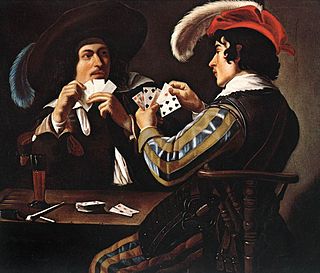
A card game is any game using playing cards as the primary device with which the game is played, be they traditional or game-specific.
Five-card draw is a poker variant that is considered the simplest variant of poker, and is the basis for video poker. As a result, it is often the first variant learned by new players. It is commonly played in home games but rarely played in casino and tournament play. The variant is also offered by some online venues, although it is not as popular as other variants such as seven-card stud and Texas hold 'em.

Poker is a family of comparing card games in which players wager over which hand is best according to that specific game's rules in ways similar to these rankings. While the earliest known form of the game was played with just 20 cards, today it is usually played with a standard deck, although in countries where short packs are common, it may be played with 32, 40 or 48 cards. Thus poker games vary in deck configuration, the number of cards in play, the number dealt face up or face down, and the number shared by all players, but all have rules that involve one or more rounds of betting.
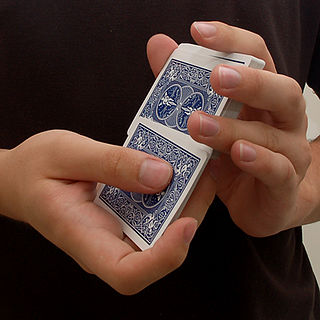
Shuffling is a procedure used to randomize a deck of playing cards to provide an element of chance in card games. Shuffling is often followed by a cut, to help ensure that the shuffler has not manipulated the outcome.
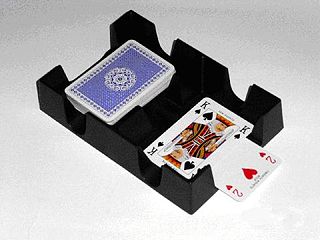
In card games, to cut the cards is to split the deck into two packets by lifting one packet from the top and placing it face down beside the remainder; before placing the lower packet on top of it. This is typically done after the cards have already been shuffled, and the procedure is used just prior to the cards being dealt to the players. The aim of this is to reduce the possibility of cheating, for example, by knowing the bottom card. Cutting the cards is also a common way of determining the seating order at a card table, the partnerships or the first dealer.
Face Up Pai gow poker has no commission, the Designated Player's hand is played face up, and is played with a standard 52 plastic card deck and a single Joker, for a total of 53 cards. The Joker may be used as any type of card to complete a Straight, Flush, or Straight Flush. In Face Up Pai Gow Poker, the dealer’s cards are dealt Face Up prior to player’s setting their hand. After all players sets their hands in the designated space face down, the dealer will then compare each player's five-card hand to the dealer's five-card hand, and each player’s two-card hand is compared to the dealer’s two-card hand to determine the winners, losers, or tie hands. The game of face up pai gow poker was created in 2016 in the United States by Johnny Phong Le.

Yablon, also known as red dog, is a game of chance played with cards, in which two cards are dealt and a player bets on whether the rank of a third card would fall between them. While found in some land casinos, its popularity has declined, although it is featured at many online casinos.
Five-card stud is the earliest form of the card game stud poker, originating during the American Civil War, but is less commonly played today than many other more popular poker games. It is still a popular game in parts of the world, especially in Finland where a specific variant of five-card stud called Sökö is played. The word sökö is also used for checking in Finland.

Texas hold 'em is one of the most popular variants of the card game of poker. Two cards, known as hole cards, are dealt face down to each player, and then five community cards are dealt face up in three stages. The stages consist of a series of three cards, later an additional single card, and a final card. Each player seeks the best five card poker hand from any combination of the seven cards; the five community cards and their two hole cards. Players have betting options to check, call, raise, or fold. Rounds of betting take place before the flop is dealt and after each subsequent deal. The player who has the best hand and has not folded by the end of all betting rounds wins all of the money bet for the hand, known as the pot. In certain situations, a "split-pot" or "tie" can occur when two players have hands of equivalent value. This is also called a "chop-pot". Texas hold 'em is also the H game featured in HORSE and in HOSE.
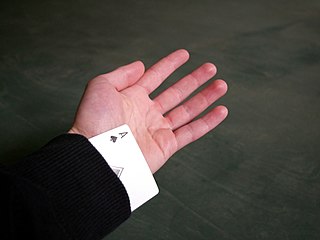
Cheating in poker is any behavior outside the rules that is intended to give an unfair advantage to one or more players.

Card manipulation is the branch of magic that deals with creating effects using sleight of hand techniques involving playing cards. Card manipulation is often used in magical performances, especially in close-up, parlor, and street magic. Some of the most recognized names in this field include Dai Vernon, Tony Slydini, Ed Marlo, S.W. Erdnase, Richard Turner, John Scarne, and Ricky Jay. Before becoming world-famous for his escapes, Houdini billed himself as "The King of Cards". Among the more well-known card tricks relying on card manipulation are Ambitious Card, and Three-card Monte, a common street hustle also known as Find the Lady.

Three Card Poker is a casino table game based on poker.

A shuffling machine is a machine for randomly shuffling packs of playing cards.
Cheating in casinos refers to actions by the player or the house which are prohibited by regional gambling control authorities. This may involve using suspect apparatus, interfering with apparatus, chip fraud or misrepresenting games. The formally prescribed sanctions for cheating depend on the circumstances and gravity of the cheating and the jurisdiction in which the casino operates. In Nevada, for a player to cheat in a casino is a felony under Nevada law. In most other jurisdictions, specific statutes do not exist, and alleged instances of cheating are resolved by the gambling authority who may have more or less authority to enforce its verdict.
This is a glossary of conjuring terms used by magicians.
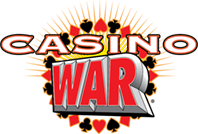
Casino War is a proprietary casino table game based on the game of War. It is distributed by Shuffle Master, a division of Scientific Games. The game is one of the most easily understood casino card games.
The World Series of Blackjack is a televised blackjack tournament created and produced by the cable network GSN. It is a closed tournament; players are either invited to play or attempt to win a spot via a satellite tournament. Rounds are edited into 1-hour episodes and broadcast on GSN. Matt Vasgersian and Max Rubin provided commentary for the first two seasons. Tiki Arsenault was the dealer for Season 1 as Deanna Bacon was the dealer for Seasons 2 and 3 while Jessica Knight was the dealer for Season 4.
In card games, hole carding is the obtaining of knowledge of cards that are supposed to be hidden from view. The term is usually applied to blackjack but can apply to other games with hidden hole cards, like three card poker and Caribbean stud poker. So long as it does not involve the use of a device like a mirror or actions like touching the dealer's cards, in most jurisdictions hole carding is a legal form of advantage gambling. In some games, like stud poker, casinos normally have rules against rubbernecking or having a confederate stand behind an opponent to signal hole cards.
The following is a glossary of poker terms used in the card game of poker. It supplements the glossary of card game terms. Besides the terms listed here, there are thousands of common and uncommon poker slang terms. This is not intended to be a formal dictionary; precise usage details and multiple closely related senses are omitted here in favor of concise treatment of the basics.